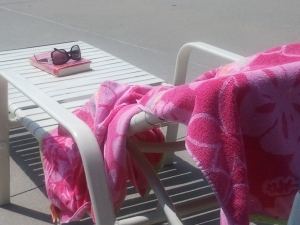I love lazy, unstructured summers. For a week or two…. After that I need some purpose.
Even as a youngster, I kept a calendar in the summer marking vacation and camp, and how I was doing in the library summer reading program.
 I’m the same as an adult, although now I try to ensure that I do have some lazy, unstructured weeks to my summer. I have my vacation days allotted and mainly they will be spent lounging poolside.
I’m the same as an adult, although now I try to ensure that I do have some lazy, unstructured weeks to my summer. I have my vacation days allotted and mainly they will be spent lounging poolside.
But there will be days with purpose, including —
Reading. I’ll read my mysteries and fiction. I also will read books on self-management, communications and leadership. During the summer, I spend more time outdoors, often in a lounge chair with a book in hand.
Writing. I’ll work on my book and my blog. My accountability partner will keep me from slacking too much. I may even do some writing poolside (although not too close).
Walking. I always enjoy walking in the cool of the morning or evening. To keep me motivated to do that this summer, I set an ambitious goal. I’m calling it my One Million Steps to Success Plan. One of my colleagues has agreed to join me on this plan. We must walk a minimum of 10,000 steps each day (and sometimes more) from Memorial Day through Labor Day. When we succeed, we will have walked one million steps!
I say this is highly ambitious because I’ve yet to walk 70,000 steps in a week. So why will I succeed with this?
- I have someone to do it with.
- It’s fun and just quirky enough to motivate me.
- We broke the summer down into bit-sized chunks. Between now and Flag Day, for example, we must walk 155,000 steps. Today, I did 10,000.
- I have fewer commitments in the summer and, therefore, fewer distractions to keep me from walking.
What direction will your summer take?
PS Feel free to send encouraging words my way and cheer me on.
